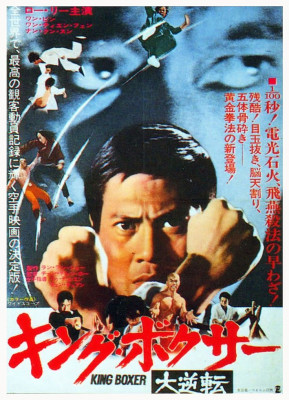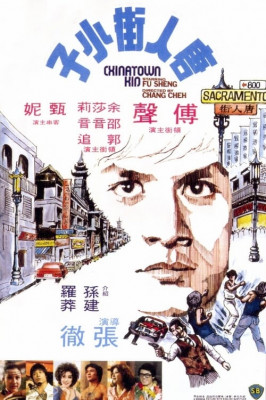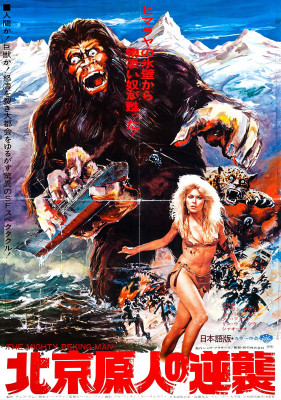| Reviews & Columns |
|
Reviews DVD TV on DVD Blu-ray 4K UHD International DVDs In Theaters Reviews by Studio Video Games Features Collector Series DVDs Easter Egg Database Interviews DVD Talk Radio Feature Articles Columns Anime Talk DVD Savant Horror DVDs The M.O.D. Squad Art House HD Talk Silent DVD
|
DVD Talk Forum |
|
|
| Resources |
|
DVD Price Search Customer Service #'s RCE Info Links |
|
Columns
|
|
|
Shaw Scope: Volume One (12-movie, 8-Disc Limited Edition)
Shaw Scope: Volume One (you mean there will be more!?) is a massive boxed set from Arrow Video, an eight-disc, 12-movie set of representative (sort-of) titles from Shaw Brothers (HK) Ltd., the dominant Hong Kong-based movie company of the 1960s and well into the ‘70s. Though various Shaw brothers had been kicking around the Asian film industry since 1925, it was this company, founded in 1958, that is most famous. Their Clearwater Bay studios, with its 15 soundstages, two backlots, state-of-the-art equipment and 1,300 employees, many culled from other parts of Asia, including Japan and South Korea, all but defined Hong Kong cinema for two decades. Their main rival, Cathay, ceased film production in 1970, but soon after a more lasting upstart, Golden Harvest, partly composed of disgruntled ex-Shaw employees, and a glut of far smaller but prolific independents, eventually led to Shaw itself turning away from film production in favor of TV films in 1986.
For mainstream audiences, Shaw is remembered today mainly for its ‘60s period swordplay action films and ‘70s kung fu epics, but in fact the studio made Hollywood-style (or, more accurately, Japanese-style) musicals, spy thrillers, contemporary comedies, and later occasionally dabbled in the financing of Hollywood films (notably Meteor and Blade Runner). Shaw Scope Volume One with a single exception focuses on the company's ‘70s kung fu output.
Back around 1999, uber Hong Kong cinema fan and friend Jeff Briggs alerted me to a Hong Kong video store east of downtown Los Angeles selling region 3 DVDs of numerous Shaw Brothers titles that had been remastered and packed with extra features (many of the latter of which are repurposed here). Seeing good transfers of these long-neglected movies was something of a revelation. Then as now I knew little about the films or the genre, but many of the titles, released in monthly waves, were mesmerizing, and it was impossible, eventually, to keep up with all the new titles coming out. Arrow's boxed set is another embarrassment of riches, excellent new transfers of the films with myriad audio options and packed to the gills with special features, including a full-color booklet.
One imagines two different audiences for this boxed set: those who'll want to binge-view their way through all the movies and extra features over many days (surely not one day) and those, like me, who'll enjoy these films but in small doses, like maybe one or two a month. Fun as these are, my personal tastes find nearly all Hong Kong movies inferior to Japanese films from the same period, to use one example. Even the Shaw films have shoddy aspects: shots wildly out-of-focus, their (a-hem!) sampling of film scores (A-HEM!) lifted from western-world composers (John Barry was a favorite). To me, even comparable Japanese genre films exhibited more polish, more variety and more depth. Further, Japanese major studios made room on their schedules for more ambitious product, made by genuine artists like Kurosawa, Mizoguchi, and Ozu. I don't feel any of the directors working at Shaw Bros. comes anywhere close to the best work of Japan's top filmmakers covering this same era. This is not to diminish the fun these films offer; they cater to a culturally different movie audience with different needs. But it does seem strange that even Shaw movies with obvious potential to rise above the usual fair, Chinatown Kid (1978) for instance, always give in to cheap action and lowbrow comedy.
With more than a 24-hour day's worth of movies and extra features, I couldn't possibly review everything for the purpose of this review, but here are some highlights:
After watching King Boxer (Tiān xià dì yī quán, 1972), I wasn't surprised to learn that it was made directly in response to Bruce Lee's first big Hong Kong hits: The Big Boss (1971) and Fist of Fury, released earlier in 1972. Lee had offered his services to Shaw before anyone else, but they insulted him by offering a no-frills standard contract, with no profit participation, no control over the movies he would appear, no nuthin'. Instead, Lee struck a deal with ex-Shaw executive Raymond Chow's Golden Harvest and, smarting from this lost opportunity, Shaw set out to fashion its own Bruce Lee-like kung fu epic.
Rather than resembling the myriad imitation Bruce Lee pictures made after that actor's untimely death, King Boxer imitates the emerging genre's tropes, its plot remarkably similar in many ways to Fist of Fury, with martial arts student Chi-Hao (Lo Lieh) compelled to leave his aging master (and master's daughter) for the more prestigious Shen Chin-Pei school. After numerous setbacks, Chi-Hao advances to the top of the class just in time for the big tournament, in which rival Ming Dung-Shun will stop at nothing to win, including employing thuggish, sword-brandishing Japanese thugs (negative Japanese stereotypes being common within the genre) to kill off all potential rivals to the prize.
Unlike Shaw's earlier, more balletic period swordplay films, King Boxer is much grimmer (like the end of Hamlet, practically everyone's dead by the end) and more violent, including one scene graphically depicting every ‘60s-‘70s parent's worst nightmare, that their kids might imitate Moe Howard of The Three Stooges -- and well, you've gotta see it for yourself.
King Boxer was a huge hit across Asian and, more significantly, in the western world as well, the first Hong Kong production to really break into the semi-mainstream market. Probably made for less than $300,000, it reportedly earned more than USD $10 million worldwide.
Chinatown Kid really should have been titled Chinatown Kids, for its intriguing premise contrasts two unformed young men, Tan Tung (Alexander Fu Sheng), who can't catch a break in Hong Kong, even with a modest orange juice stall he tries running with his grandfather and eventually smuggled into San Francisco; and Yang Chien-wen (Sun Chien), a studious Taiwanese trying to make ends meet by illegally working at the same Chinatown restaurant where Tan is employed. Full of hope for the future, they board together in a storage closet above the restaurant's deep fryer. When they stand up to local gangsters demanding protection money, the restaurant owner fires Yang lest the gangsters inform Immigration about the illegal hiring, while ultra-naïve Tan goes to work for an "entertainment company" that's actually pushing heroin.
Presented in two very different cuts, Chinatown Kid is a nice break from the period martial arts action for several reasons. Alexander Fu Sheng, who tragically died soon after in a car accident, has enormous screen presence not unlike contemporary Jackie Chan in his early days. Further, the struggles (and criminal temptations) of the pitifully poor in Hong Kong is fascinating. When the pair move into their "room," a hot and steamy space above the kitchen, so small they can't even stand up straight, they never once complain. It's a roof over their heads, the rent is cheap, and it's the kind of sacrifice generations of Asians from all over made to get ahead.
The picture is, however, undermined by the usual Shaw concessions to the lowest common denominator audience demographic, requiring Tan Tung to be incredibly stupid and naïve, and wildly inconsistent in characterization, sweet-natured and generous some of the time, obsessed with material gain for the gaudiest of gaudy riches, including a then-exotic but now hilariously primitive digital watch. It's really a shame the Shaw Bros. almost never made at least partly realistic films about the struggles of Hong Kong's poor. This, far more than the martial arts and shoot-ups, is the more interesting aspect of Chinatown Kid. The only Shaw Bros. title I'm aware of that digs a little deeper into this area is The House of 72 Tenants (1973), possibly the first Shaw Bros. title primarily in Cantonese. That one would have been a good choice for this volume.
The one-off The Mighty Peking Man (1977) is Shaw attempting to capitalize on the Dino de Laurentiis King Kong from the year before. It's very entertaining for all the wrong reasons. It's not consciously campy like de Laurentiis's production, yet far more hilarious. It goes through the motions recreating all the tropes yet completely lacking is any attempt at myth-making with its monster. It's as if the filmmakers were afraid of asking its audience to take what unfolds onscreen seriously, so instead their approach is to make everything far more ludicrous than it needs to be.
It's more or less a straight, if uncredited remake, the main difference is that the Fay Wray character is no longer a city girl the Kong-like creature finds attractive, but rather a Sheena-like jungle princess (played by blonde Swiss actress Evelyne Kraft). The main point of interest are the man-in-suit miniature special effects, directed by Japanese genre veteran Sadamasa Arikawa and assisted by Koichi Kawakita. There are far more individual special effects shots than your average Godzilla movie, perhaps three or four times as much, and many of these are incredibly shoddy, filmed in the same hurried style as other Shaw pictures. On the other hand, some of the miniature work, particularly a few brief scenes of Hong Kong at night, are astounding in their detail.
Video & Audio
Arrow's incredibly attractive boxed set includes all 12 movies presented in 2.35:1 "Shaw Scope," with The Mighty Peking Man filmed in anamorphic Panavision. Seven of these are presented in new 2K restorations, but they all good pretty darn good. Many also offer new English subtitle translations, English-dubbed tracks, and both Mandarin and Cantonese when available. Discs are packaged in a sturdy book and are easy to remove. For the record, the films included here are King Boxer, The Boxer from Shantung, Mighty Peking Man, and Chinatown Kid, all in stand-alone disc form; and double-feature discs of Five Shaolin Masters/Shaolin Temple, Challenge of the Masters/Executioners from Shaolin, The Five Venoms/Crippled Avengers, Heroes of the East/Dirty Ho. The uncompressed mono audio of the various versions are all good, though the Mandarin and Cantonese tracks tend to be in much better shape than their English-dub counterparts. Region "A" encoded.
Extra Features
Supplements are virtually endless. The highlight is a hardbound 60-page, full-color book featuring new essays, cast and crew lists and notes, and newly commissioned artwork. There are hours and hours of older and brand-new or never-before-seen interviews, some culled from earlier Hong Kong DVD releases and others from the Frederic Ambroisine Video Archive. Other extras include audio commentaries galore, alternate opening titles, Hong Kong and international trailers, on-set home movies, image galleries, TV and radio spots. If that weren't enough, two CDs offer soundtracks to six of the movies included here, and there are two very different cuts of Chinatown Kid running 115 and 90 minutes. Indeed, this set is so packed with extra features, listing them all would run far longer than the rest of this review.
Parting Thoughts
While I must confess to not being entirely enamored of the movies themselves -- a little goes a long way for me -- Arrow's packaging cannot be faulted. In the home video field, this is a genuinely incredible release and a DVD Talk Collectors Series title.
Stuart Galbraith IV is the Kyoto-based film historian largely absent from reviewing these days while he restores a 200-year-old Japanese farmhouse.
|
| Popular Reviews |
| Sponsored Links |
|
|
| Sponsored Links |
|
|
| Release List | Reviews | Shop | Newsletter | Forum | DVD Giveaways | Blu-Ray | Advertise |
|
Copyright 2024 DVDTalk.com All Rights Reserved. Legal Info, Privacy Policy, Terms of Use,
Manage Preferences,
Your Privacy Choices | |||||||
















